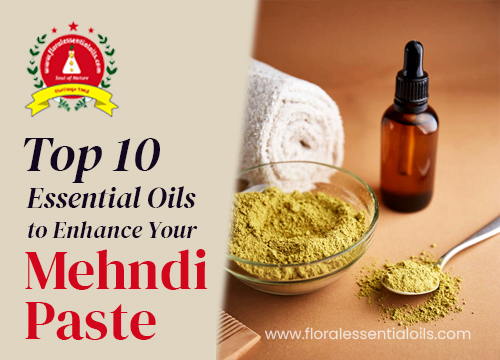Mehendi, or henna, is an ancient art form that has captivated cultures worldwide. Its intricate designs, rich colors, and temporary nature make it a beloved adornment for special occasions and everyday celebrations. While the base henna paste is crucial, the addition of essential oils can transform your mehendi experience, enhancing color, longevity, and even the overall sensory appeal of the process. Let’s explore the top 10 essential oils that can elevate your mehendi game.
Why Use Essential Oils in Mehendi Paste?
Beyond their delightful fragrances, essential oils offer several benefits when incorporated into mehendi paste:
Color Enhancement: Some oils are believed to intensify the henna stain, resulting in a deeper, richer hue.
Longevity: Certain essential oils can help prolong the life of the henna stain, ensuring your beautiful designs last longer.
Antiseptic Properties: Many essential oils possess natural antiseptic qualities, helping to protect the skin during the mehendi process.
Skin Conditioning: Some oils can nourish and soothe the skin, providing a pleasant application experience.
Aromatic Experience: The delightful fragrances of essential oils can enhance the overall mehendi experience, creating a relaxing and enjoyable atmosphere.
Top 10 Essential Oils for Mehendi
Tea Tree Oil: Renowned for its antiseptic properties, tea tree oil helps prevent infections and can potentially enhance the color depth of your mehendi.
Eucalyptus Oil: With its refreshing aroma, eucalyptus oil is believed to boost color intensity. However, use it sparingly as it can be very powerful.
Lavender Oil: Known for its calming and soothing properties, lavender oil can help relax the skin and may contribute to a longer-lasting stain.
Lemon Essential Oil: While not directly added to the paste due to its light-sensitizing properties, lemon juice is often used as a post-mehendi application. Lemon essential oil can be a safer alternative, but always dilute it properly.
Cajeput Oil: This lesser-known oil is a hidden gem for mehendi. Rich in terpenes, it’s believed to enhance the staining process, leading to a darker and longer-lasting henna design.
Rosemary Oil: Stimulating blood circulation, rosemary oil can potentially improve the absorption of henna pigments, resulting in a deeper stain.
Clove Oil: With its strong, warm aroma, clove oil is said to contribute to a darker henna stain. However, use it cautiously as it can be irritating to the skin.
Peppermint Oil: Offering a cooling and refreshing sensation, peppermint oil can also stimulate blood flow to the skin, potentially enhancing color development.
Cedarwood Oil: Known for its balancing properties, cedarwood oil can help regulate oil production on the skin and contribute to a longer-lasting henna stain.
Geranium Oil: With its uplifting floral aroma, geranium oil can enhance the overall sensory experience and potentially improve the appearance of your mehendi design.
DIY Mehendi Paste Recipes
Basic Mehendi Paste:
- 2 tablespoons henna powder
- 2 tablespoons lemon juice
- 1 tablespoon strong brewed black tea
- A few drops of your chosen essential oil (e.g., tea tree, eucalyptus)
- 1 tablespoon sugar (optional)
Instructions:
- Mix henna powder, lemon juice, and black tea in a glass bowl.
- Create a thick, smooth paste by adding water gradually.
- Add essential oil and sugar, if desired.
- Store the paste in an airtight container for at least 12 hours, preferably in a warm place, to allow the henna to release its color.
Rich Color Mehendi Paste:
- 2 tablespoons henna powder
- 2 tablespoons lemon juice
- 1 tablespoon strong brewed black tea
- 1 teaspoon ground cloves
- A few drops of cajeput essential oil
- 1 tablespoon sugar (optional)
Instructions:
- Follow the same steps as the basic recipe, but add ground cloves and cajeput oil for a deeper color.
Tips for Using Essential Oils in Mehendi
Patch Test: Always perform a patch test on a small area of skin before applying any new essential oil to your mehendi paste.
Dilution: Essential oils are highly concentrated, so dilute them with a carrier oil like coconut or olive oil before adding to the henna paste.
Start Small: Begin with a few drops of essential oil and gradually increase the amount if desired.
Fresh Paste: For the best results, use freshly prepared henna paste.
Application Technique: Proper application is crucial for achieving beautiful mehendi designs.
Aftercare: Protect your henna design from water and harsh soaps to prolong its life.
By carefully selecting and using essential oils, you can create stunning mehendi designs that are not only visually appealing but also beneficial for your skin. Experiment with different combinations to find your perfect mehendi formula and enjoy the art of body adornment.


